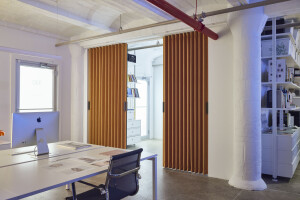Our 100% Recycled Textures line utilizes revolutionary molecular recycling technology to upcycle waste—like clothing and carpet fibers, dense plastic containers, and packaging—into dimensional panels of our flagship translucent, formable resin without compromising quality. 25 three-dimensional patterns are available, providing varying levels of light diffusion and object obscurity. Choose between four dual-sided designs, created by molding complementary patterns on both sides of the resin, and 21 single-sided offerings, ranging from modern renditions of traditional reeded glass to bold recreations of art deco–inspired shapes.
Developed to produce captivating optical effects, 100% Recycled Textures provide a modernized, more durable alternative to glass that is easier to tailor and fabricate on site. They are ideal for applications like half desk partitions, sliding doors, full partitions, wall dividers, and art features and are perfect for introducing a tangible interplay of light and shadow in healthcare, corporate, education, hospitality, and retail environments. Designers may choose to leave the Textures in their clear form or specify them in color.
The molecular recycling process at the heart of our 100% Recycled Textures line breaks plastics down into molecular components to create new materials, allowing us to make optically clear, durable resin from 100% recycled content. Compared to the traditional mechanical recycling process, which is limited to specific sources of plastic waste that can be recycled a finite number of times, molecular recycling can break down a much broader range of waste an infinite number of times. By integrating molecular recycling into our manufacturing process, we can reduce manufacturing emissions by 25% and divert more waste from landfills. Each 100% recycled resin panel diverts the equivalent of 3,296 plastic water bottles from the landfill—stacked on end, that's 7.2 times the height of the Statue of Liberty. For every 50,000 LBS of molecularly recycled material processed, 21,000 LBS or 10 Metric Tons of CO2 equivalent emissions are avoided. That's equivalent to the emissions from 23,636 miles driven in the average passenger vehicle or almost one trip around the earth (95% of the way).

















